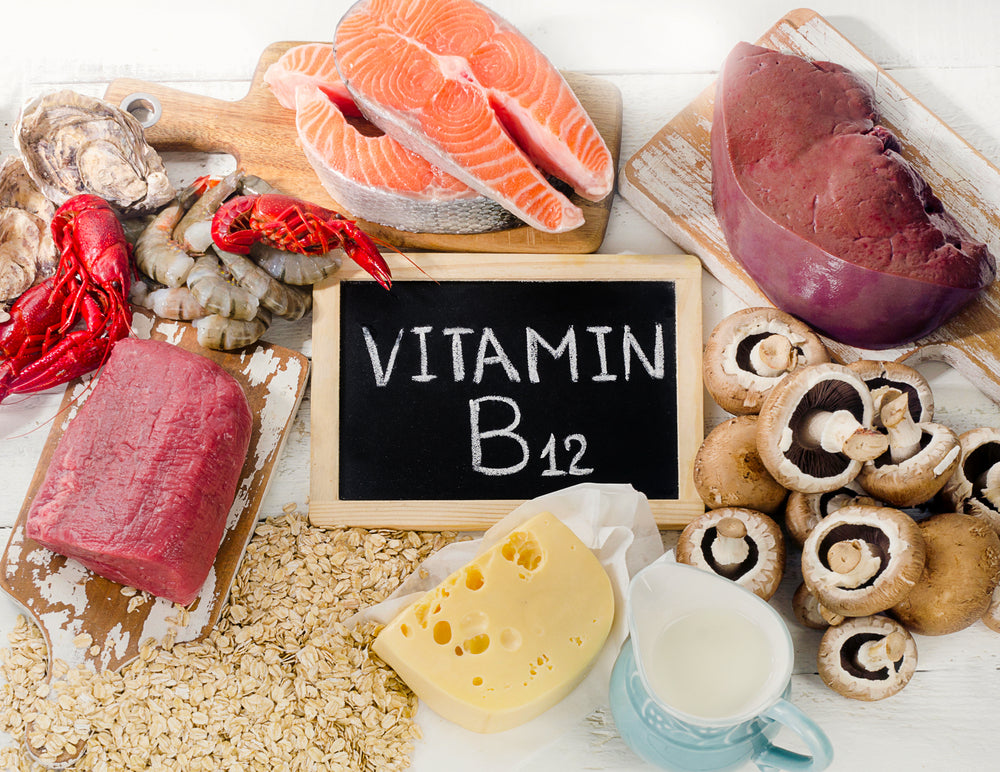Vitamin B12 is otherwise known as cobalamin because it’s the only vitamin that contains the essential mineral, cobalt. It was first isolated from liver extract in the late 1940s and was found to be the answer to a very serious condition called pernicious anaemia. Thankfully this fairly rare condition can now be identified much earlier. However, deficiency of vitamin B12 is still remarkably common.
Clinical nutritionist, Suzie Sawyer, shares her thoughts on vitamin B12.
Why is it so important?
Vitamin B12 is key to the healthy production of red blood cells and the myelin sheath around nerve cells, hence it’s important for nerve function. B12 also works with folic acid (vitamin B9) in many body processes. Indeed, a deficiency of either nutrient can often be masked by the other, hence if a blood test is taken, it should involve both vitamins.
Importantly, vitamin B12 is known as a methyl donor, which carries and donates methyl groups (carbon and hydrogen molecules) to cell membranes and brain neurotransmitters. It’s a positive chemical reaction, one of its main roles being the metabolism of homocysteine. This is an amino acid produced in the body, high levels of which can potentially cause an array of health issues. Vitamin B12 is also involved with energy metabolism and immune function, so as you can see it’s pretty important!
Where can I find it?
Unlike other water-soluble nutrients (such as other B-vitamins), B12 is stored in the liver, kidneys and other body tissues, but obviously only if there’s some available in the diet. Absorption is also dependent on having sufficient hydrochloric acid in the stomach which reduces as we get older. It is also thought that the beneficial bacteria naturally living in the gut, may produce some vitamin B12; research is very unclear though as to how much can actually be utilised. Plus, it’s likely that the good gut flora needs to be in tip-top condition for this process to take place, and many people have an imbalance in this area.
Vitamin B12 is only found in animal produce, including offal (liver and kidneys), eggs, fish, cheese and meat. There may be some found in fermented sources such as sea vegetables and tempeh. But although vegans are often told that fermented foods, including miso and tofu, are good sources, there’s a big question mark about whether it’s in the form the body can utilise. Therefore fermented foods are certainly not a reliable source of vitamin B12.
In short, animal products are the only assured source which means that vegans are highly likely to be deficient unless they’re taking a supplement.
TEN FOODS HIGH IN B12
Lamb’s liver
Clams
Beef liver
Kidneys
Chicken livers
Oysters
Sardines
Trout
Salmon
Eggs
Many people shy away from liver because the taste is too strong. However, the flavour of chicken livers is much more subtle and they’re great served warm with a salad, as a quick and delicious midweek meal. For a good contrast of flavours, mix salad leaves with some chopped hazelnuts and goat’s cheese. The chicken livers can be quickly fried (a couple of minutes per side) sprinkled with a little paprika and served immediately.
How do I know if I have a deficiency?
We know the body can store some vitamin B12, so a deficiency can sometimes take a while to come to light and then symptoms may be slightly vague and non-specific.
Deficiency may cause extreme tiredness, plus nerve function can be off-balance triggering ‘pins and needles’, numbness or a burning feeling anywhere in the body. Low mood, lack of concentration and depression are also commonplace. More dramatic symptoms leading up to pernicious anaemia are likely to be persistent diarrhoea and a very red, inflamed tongue, but this is uncommon.
What should I do?
Deficiency of vitamin B12 is often down to poor absorption and low dietary intake. The likelihood of deficiency also increases with age as digestive issues become enhanced. Plus, anyone with poor digestion is much more likely to have a deficiency. The good news is that by either increasing the amount you eat in the diet or taking a supplement containing vitamin B12, you can be sure you’re getting enough of this essential vitamin.

